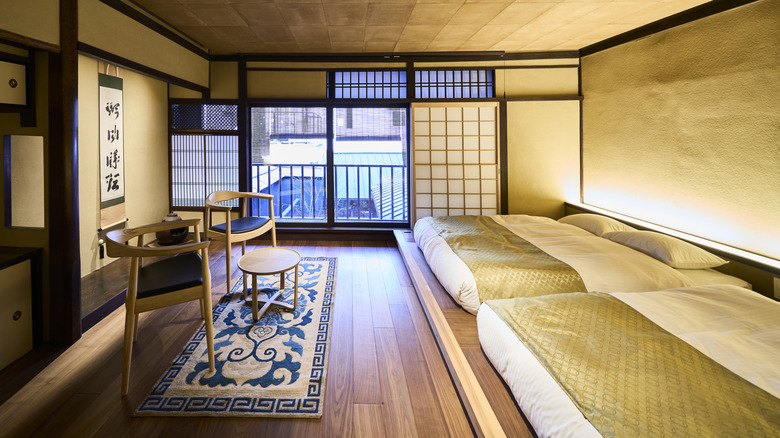Tourists Visiting Japan Shouldn't Be Caught Off Guard By This Charge On Hotel Bills
Travelers know to expect the unexpected when it comes to hotel bills. Even the most seasoned globetrotter has probably faced a head-scratching add-on at checkout, like a vaguely worded resort fee or a hefty cleaning charge. Japan is no exception, but the good news is that the fee you'll encounter most often is straightforward and relatively small. It's the accommodation tax, a government-imposed charge that most tourists to the country will pay. To make sure you're not caught off-guard when it appears on your bill, it's worth knowing where it applies, how much the tax is, and why it exists.
You may have seen recent headlines claiming that Japan is introducing a brand-new tourist tax. But the truth is, in many parts of Japan, the accommodation tax has been around for years. It was first introduced in Tokyo all the way back in 2002, and other popular spots, including buzzing Osaka and historic Kyoto, followed in 2017 and 2018, respectively. And in most places, it doesn't just apply to hotels but to private lodgings (think Airbnbs), too.
What is new in 2025 is the expansion of this tax to new cities and municipalities. In March 2025, 11 new places joined the list, ranging from cities on the northern island of Hokkaido to Hiroshima Prefecture near the tip of Honshu. More regions look set to follow in the near future.
How much is Japan's accommodation tax, and why does it exist?
The amount you'll pay depends on the cost of your accommodation, but it tends to range from 100–500 yen per night (about $0.70 to $3.40 at the time of writing). That's a modest charge in the context of a larger hotel bill. Kyoto is an outlier, with the nightly charge for the most expensive accommodations currently 1,000 yen (around $6.80). This is likely to increase to 10,000 yen (about $65) per night soon for top-tier stays. Meanwhile, in Tokyo, accommodations that cost under 10,000 yen per night don't incur the fee, giving you a great reason to check out the city's budget-friendly capsule hotels! Your accommodation will usually collect the tax, though it may or may not be included in your bill when paying online, so you might need to ask to be sure.
But what exactly are these fees for? It's no secret that Japan has seen soaring visitor numbers since opening its doors to tourism again in 2023. In the major centers, overtourism is becoming a real issue, with certain towns even seeking to limit tourist numbers. But another approach to coping with overtourism is the accommodation tax. Most municipalities use or intend to use the revenue collected to develop tourism facilities. This might fund infrastructure, like public transport, or the repair of cultural sites, benefiting both locals and tourists alike. Think of the accommodation tax as your small contribution to keeping Japan a beautiful destination.

